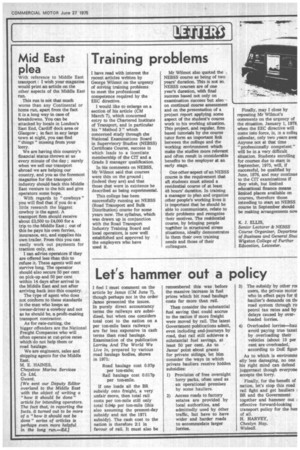Training problems
Page 47

If you've noticed an error in this article please click here to report it so we can fix it.
I have read With interest the recent articles written by George Wilmot on the urgency of solving training problems to meet the professional competence required by the EEC directive.
I would like to enlarge on a section of his article (CM March 7), which concerned entry to the Chartered Institute of Transport, and in particular his "Method 3" which concerned study through the National Examinations Board in Supervisory Studies (NEBSS) Certificate Course, success in which leads to a licentiate membership of the CIT and a Grade 3 manager qualification.
In his comments on NEBSS, Mr Wilmot said that courses were thin on the ground ; (indeed they are) and that those that were in existence he described as being experimental.
This college has been successfully running an NEBSS (Road Transport and Bulk Distribution) course for some years now. The syllabus, which was drawn up in conjunction With the Road Transport Industry Training Board and local operators, is now well established and approved by the employers Who have used it. Mr Wilmot also quoted the NEBSS course as being of two years' duration. This is not so. NEBSS courses are of one year's duration, with final success based not only on examination success but also an continual course assessment and on the presentation of a project report applying some aspect of the student's course work to his working situation. This project, and regular, firm based tutorials by the course tutor form an important link between the college and the working environment which make the studies more relevant and often result in considerable benefits to the employer at an early stage.
One other aspect of an NEBSS course is the requirement that all students must attend a residential course of at least 48 hours' duration. In training a manager to plan and organise other people's working lives it is important that he should be able to communicate, relate to their problems and recognise their motives. The residential course, by bringing people togther in structured stress situations, ideally demonstrates 6 them their own training needs and those of their colleagues. Finally, may I close by repeating Mr Wilmot's comments on the urgency of the situation. January 1, 1978, when the EEC directive will come into force, is, in a colle calendar, only two years awe: Anyone not at that time "professionally competent" will be in a very difficult situation. Students enrolling for courses due to start in September, 1975, Will, if successful, be qualified by June, 1976, and may continue to the CIT examinations if they wish, but limited educational finance means limited places available on courses, therefore those intending to start an NEBSS course in September should be making arrangements novs; K. J. ELLIS,
Senior Lecturer & NEBSS Course Organiser, Departme of Business and General Stuc Wigston College of Further Education, Leicester.




















































































